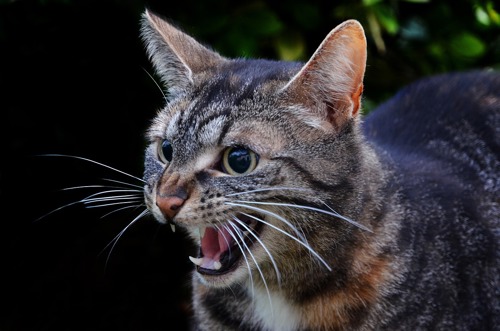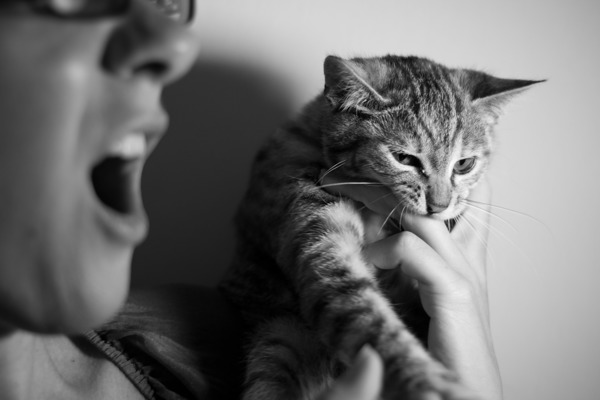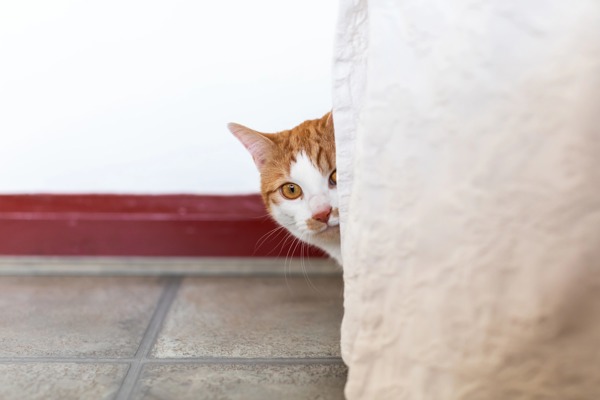Hissing is a warning that you should leave a cat alone
If a cat has ever hissed at you, it can be quite alarming. They may even bare their teeth, arch their back and puff up their fur to look particularly menacing. But cats don’t hiss to be naughty, and a hiss doesn’t necessarily mean they don’t like you.
Clinical Animal Behaviourist Daniel Warren-Cummings explains why cats hiss and how you should respond if your cat hisses at you.
Why do cats hiss?
Hissing is a natural behaviour for cats, but it’s a sign that something is wrong. Cats hiss to communicate that they are unhappy.

Before cats hiss, there are usually a few warning signs first. Look out for body language clues that show they’re unhappy using our cat body language guide. If you notice any of these signs, give them space and a chance to run away and hide. Cats will usually only hiss because these warning signs have been missed. The hiss is a last resort to show they are really unhappy.
If your cat is hissing regularly, this is a sign that they are incredibly stressed. You should try to find out the cause of their stress and resolve it as soon as possible.
Reasons why cats hiss
1. They’re scared or feel threatened
The most common reason cats hiss is fear. If they feel scared or threatened, they may hiss as a defensive warning. Hissing is their way of saying ‘back off’. Cats usually prefer to avoid physical confrontation, so the hiss is designed to scare humans and other animals away before this happens.
Common reasons a cat may be scared and hiss are:
- an unfamiliar person or animal in their territory
- sudden movements by a person they are unfamiliar with
- being touched or picked up when they’re not comfortable with it
2. They’re in pain
If your cat hisses when you touch a specific area of their body, it could be a sign that they are in pain. If the area is sensitive, they may hiss to warn you not to touch there again.
3. Maternal aggression
A mother cat may hiss at anyone who gets too close to her kittens. This is a natural behaviour that helps her protect her kittens from anyone who might mean them harm.
Why does my friendly cat hiss at me?
Even if you have a close bond with your cat, they may still hiss at you from time to time. If they are scared, in pain or stressed by something in their environment, they may hiss to encourage you to leave them alone for a while. When cats feel threatened, their bodies enter ‘fight or flight’ mode, a survival instinct that overrides their usual behaviour. In this state, they're not thinking clearly and are simply trying to protect themselves.
While the situation may not seem serious to you, it can feel overwhelming to your cat. Once they feel secure again, they’ll likely return to their normal, friendly self. That’s why it’s best to give your cat space when they seem distressed.
What should I do if my cat is hissing at me?
- Leave them alone. The first thing you should do if your cat hisses at you is back away and leave them alone. Unlike humans, cats don’t like to be comforted when they’re stressed or frightened. They prefer to be left alone. Don’t be tempted to try and comfort them with petting or cuddling. This will make them more stressed, and they may resort to attacking you if they can’t escape from the situation. Let others in the home know to leave them alone for a while too.
- Give them somewhere to hide. Provide your cat with a few hiding places around the home. Cardboard boxes, under the bed and on top of wardrobes are all good hiding spots. Being able to hide will help your cat escape the situation and calm down. Do not disturb them while they are hiding. Leave them to come out in their own time.
- Don’t punish them. Never punish your cat for hissing. They won’t understand why you are punishing them, and it will only make them more scared or stressed. This could then lead to more hissing and other unwanted behaviours.
- Find out the cause. Try to work out why your cat hissed. Addressing any underlying issues will help prevent them from hissing again. Find out below how to stop a cat from hissing.
Why is my cat hissing at my other pets?
Cats are territorial animals. It is quite common for them to feel scared or threatened by other animals in their territory. This can cause them to hiss as they try to defend their territory from the other animal.
If you have more than one cat at home and they are hissing at each other, this is a sign that they are not getting along. It also means they are likely to be very stressed and unhappy. It’s important to try to help your cats get along by following our advice below.
If you are bringing a new kitten or cat into the home with your existing cat, it’s important to introduce them properly. This will reduce the chance of them hissing at each other. Find out how to introduce cats to other cats and kittens.
If you are introducing your cat to a dog or other pet in the home, it’s also important to get this right. This will help them to get along well. Find out how to introduce cats and dogs or other pets.
What should I do if my cats are hissing at each other?
- Give both cats a chance to escape. Make sure both cats can get away from the situation. If the cats are not able to get away from each other, they could attack. If they are indoors, open doors so they can leave the area. If the cats can get away but are still hissing at each other, try approaching them and making a loud noise to scare them apart. Never get too close or try to pick one of the cats up, as they could attack you.
- Let them hide. Give both cats somewhere they can hide alone. Ideally, make sure they can retreat to separate rooms far away from each other. Provide cardboard boxes, beds or other hiding areas and do not disturb them while they are hiding.
- Help them get along. To prevent your cats from hissing at each other again, follow our advice for helping cats get along.
- Get a behaviourist. If your cats are still hissing at each other, a qualified behaviourist may be able to help. They can assess the cats’ living situations and give you tailored tips and advice to help them get along. How to find a good behaviourist.
Is it ok to hiss back at a cat?
If your cat hisses at you, it’s not a good idea to hiss back at them. Hissing at your cat is likely to scare them and make them more stressed. This could cause them to hiss more or even attack you. Instead, stay quiet and leave them alone for a while.
Why is my cat hissing when no one is around?
If your cat is hissing when there are no people or other animals around, this is very unusual behaviour. It could be that they are feeling scared or stressed by something else, or maybe they are in pain. Speak to your vet to find out the cause.
Why doesn’t my cat hiss?
Not all cats hiss. If your cat doesn’t hiss, it’s nothing to worry about. Reasons your cat doesn’t hiss could include:
-
Your cat is happy and does not need to hiss.
- Your cat is less vocal than other cats and doesn’t make any noise when they are scared or threatened. They may show other signs that they’re scared instead, such as wide eyes, flat ears, puffing up their fur or hiding.
-
Your cat growls instead of hissing.
How can I stop my cat from hissing?
The most important thing to do if your cat is hissing is to find the cause. By resolving the underlying issue, you will help your cat to be happier. They will hopefully then have no reason to hiss. Here are a few things you can do to make a better life for your cat:
- Take them to the vet. If hissing is unusual for your cat, or if they hiss when you touch them in a specific area, get them checked by a vet. They could be hissing because they are in pain.
- Understand cat body language. Before your cat hisses, they may give subtle body language clues that show they are unhappy. If you notice any of these signs, give your cat space. This will hopefully mean they don’t need to hiss at you to tell you to back off.
- Create a cat-friendly home. Providing your cat with a home that meets all their needs will help to keep them happy. Happy cats are less likely to hiss. Find out what your cat needs.
- Pet them appropriately. A common cause of hissing is when cats are handled in a way they are uncomfortable with. Find out how to pet a cat properly.
- Play with them appropriately. If your cat hisses at you during playtime, keep play sessions short to prevent them from becoming overstimulated. Find out how to play with your cat appropriately.
- Avoid stressors. There are lots of reasons why a cat may be stressed. Trying to avoid these stressors will keep your cat happy and prevent hissing. Find out how to manage your cat’s stress.



